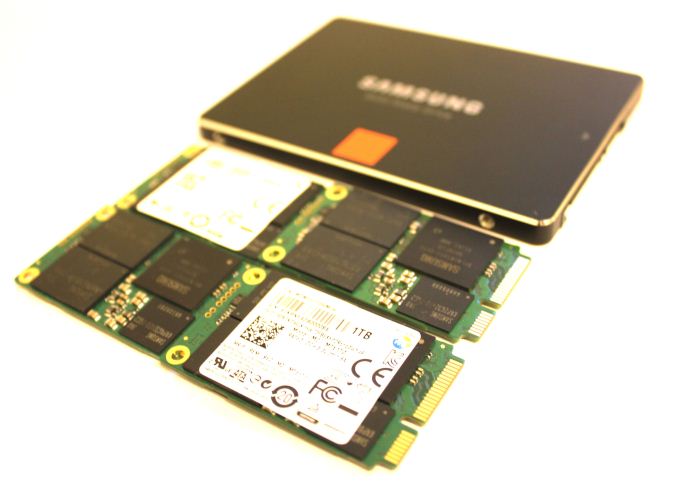Samsung SSD 840 EVO mSATA (120GB, 250GB, 500GB & 1TB) Review
by Kristian Vättö on January 9, 2014 1:35 PM ESTFinal Words
I would say the biggest market for mSATA drives right now is DIY upgrades to Ultrabooks and other laptops with existing mSATA SSDs (or in some cases there's an empty mSATA slot). One of the most common complaints I hear about Ultrabooks is their limited storage capacity because many got used to the thinking that even $400 laptops have 500GB of storage. Nowadays most SSD-only systems ship with a 128GB SSD, which to be honest is a significant downgrade if you've gotten used to having at least half a terabyte in your laptop. The rise of cloud services has reduced the need for internal storage (most smartphones and tablets only have 8-32GB) but there are still plenty of scenarios where cloud is out of question. Take photographers as an example -- if you shoot large RAW photos, uploading/downloading them constantly doesn't sound like the best idea especially if you happen to live in a region where unlimited Internet is only a dream.
In the past if you wanted a bigger mSATA SSD, your options maxed out at 256GB (Mushkin's Atlas was the only exception, though you had to sacrifice performance for capacity). For hybrid systems (i.e. PCs with a small SSD for caching and a hard drive for storage) 256GB can cut it since the storage needs are fulfilled by the hard drive but if you have an SSD-only system 256GB may not be much of an upgrade over the 128GB that most systems ship with.
Four EVO mSATA take roughly the same space as one 2.5" drive
That is where the EVO mSATA excels in. With capacity of up to 1TB and an impressive performance result, it is truly a no-compromise mSATA SSD. mSATA is no longer a tradeoff between capacity and size, the EVO mSATA provides everything that the 2.5" EVO does but at ~1/4 the footprint. Add that to the fact that the EVO mSATA is built on the same platform as the 2.5" EVO, which has been one of our highest recommendations since its release. What Anand said in his 840 EVO review's final words suits here perfectly as well: "To say that I really like the EVO is an understatement".
Samsung continually amazes me in the SSD space. The EVO mSATA is yet another proof that their engineering is state-of-the-art and almost one step ahead of others. I cannot wait to see what else Samsung has in their sleeves for 2014, and we will analyze with a critical eye as always, but the start is great for sure.












65 Comments
View All Comments
ahar - Thursday, January 9, 2014 - link
Can we also have one for the article? ;)"...so the number's you're seeing here..."
Unit Igor - Saturday, January 11, 2014 - link
Tell me Kristian please would EVO 120GB msata have any advantage over EVO 250gb msata in longer battery life when you compare power consuptipon vs. disk busy times and mb/s.I use my ultrabook only for mails ,somtimes wathing movies and surfing.I dont need more then 120GB SSD but i am willing to buy 250Gb if it would give me more battery life.What i wanted to see in your benchmark is MobileMark 2012 because msata is for laptops and that is where battery life play big roleguidryp - Thursday, January 9, 2014 - link
"endurance is fine for consumer usage"Thanks for your opinion, but I'll stick with MLC.
Do you also think Multi-TB HDDs are fine for consumer use? Since HDDs went over 1TB, they have been failing/wearing out for me regularly. I am sure you can find some theoretical numbers that say these are "fine for consumer usage" as well.
There is a big trend to bigger sizes but lower reliability. That trend can get stuffed.
Samsungs advantage of Being the only TLC player strikes me as a reason to avoid Samsung, so I can avoid TLC and decreasing endurance that goes with it.
Kristian Vättö - Thursday, January 9, 2014 - link
That's just your experience, it's not a proof that over 1TB hard drives are less reliable. We can't go out and start claiming that they are less reliable unless we have some concrete proof of that (failures on our end, statistics etc).The same applies for TLC. All we have is the P/E cycle number and frankly it gives us a pretty good estimation of the drive's lifespan and those numbers suggest that the endurance of TLC is completely fine for consumer usage. Or do you think our calculations are incorrect?
MrSpadge - Thursday, January 9, 2014 - link
And add to that that the P/E cycles are usually conservatively estimated by manufacturers. The SSD-burn-tests at XS sometimes exceed the ratings significantly.guidryp - Thursday, January 9, 2014 - link
I think if you examine any aggregate source of reviews like Newegg you will see a significant drop in drive satisfaction do to early failures, since drives went over 1TB. So it isn't just some personal fluke that half of my >1TB drives have failed worn out, so far.I am really sick of this trend of declining reliability being sold as good enough. If TLC is "good enough" I will take MLC with 3X "good enough" unless the we are talking about 1/3 the price for TLC.
Weren't the Samsung 840s failing in days for Anand last year?
Unlike reviewers, I use my products until they fail, so reliability matters a LOT, and is something that is going in the wrong direction IMO.
Kristian Vättö - Thursday, January 9, 2014 - link
Reliability is not the same as endurance. TLC has lower endurance, that's a fact, but it's not less reliable. Endurance is something you can predict (in the end all electronics have a finite lifespan) but reliability you cannot since there's a lot else than just NAND that can fail. I would claim that today's SSDs are much more reliable than the SSDs we had two years ago -- there haven't been any widespread issues with current drives (compared to e.g. early SandForce drives).Yes, we had a total of three 840 and 840 Pros that failed but that was on pre-production firmware. The retail units shipped with a fixed firmware.
This isn't a new trend. Historically we can go back all the way to 1920s when light bulb companies started rigging their products so the lifespan would be shorter, which would in turn increase sales. Is it fair? Of course not. Do all companies do it? Yes.
I do see your point but I think you're exaggerating. Even TLC SSDs will easily outlive the computer as a whole since the system will become obsolete in in a matter of years anyway if it's not updated.
gandergray - Saturday, January 25, 2014 - link
For information concerning hard drive failure rates that is more objective, please see the following article: http://www.extremetech.com/extreme/175089-who-make... .althaz - Thursday, January 9, 2014 - link
TLC is NOT a trade off in reliability, but a tradeoff in longevity.Longevity is measured in write-cycles and with heavy consumer loads TLC drives will still last for many years.
bsd228 - Thursday, January 9, 2014 - link
Other than the fact that they both store data, SSDs and HDDs have nothing in common, so it's silly to presume a problem that isn't really what you think it is in the first place. HDDs got dirt cheap as we cross the TB threshold and with it went diligent QA. You want 2TB for $80, you're going to get a higher defect rate. And going to 4 or 5 platters just increases the failure points, but the razor thin margins are the culprit here.In contrast, a bigger SSD just means either more chips, or higher density ones. But 16 chips is nothing new, and since there are no mechanical parts, nothing to worry about. Aside from OCZ, the SSD track record for reliability has been pretty solid, and Samsung (and Intel) far better than that. If you want to stick to 256G in your laptop out of a silly fear of TLC, you're just hurting yourself. The Anand guys have already shown how overstated the wear issue has become.